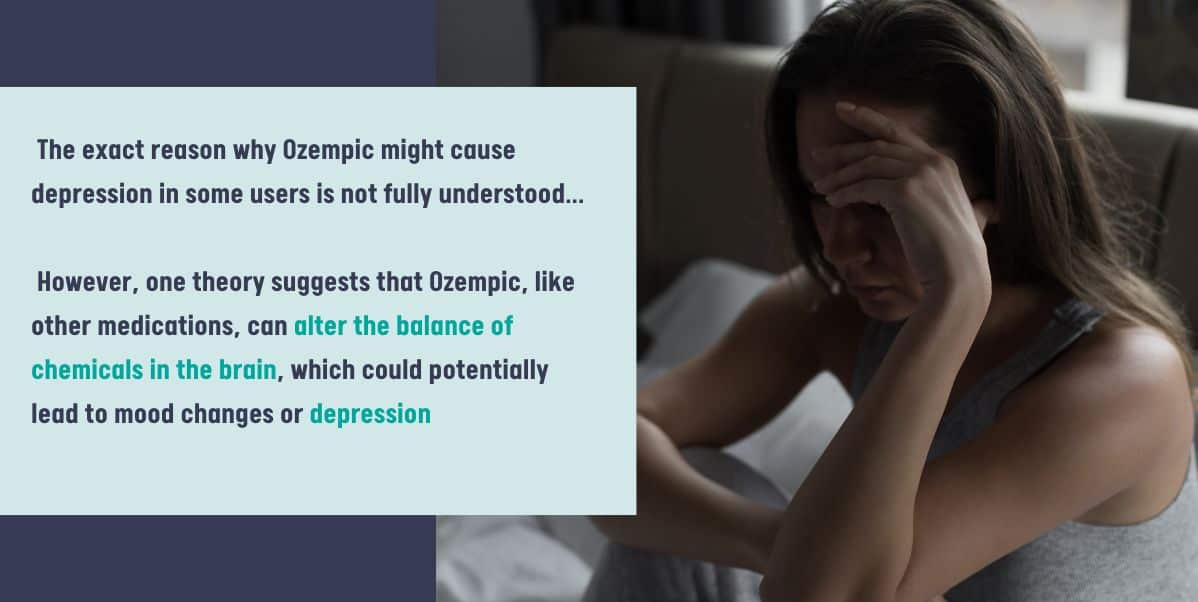
In the quest for effective diabetes management, Ozempic has emerged as a significant medication. However, along with its benefits, there are potential side effects that patients and healthcare providers must consider. One such concern is the possible link between Ozempic and depression.
This blog post delves into this critical topic, aiming to shed light on the potential connection and its implications. We’ll explore what Ozempic is, how it works, and the scientific evidence suggesting its impact on mental health.
As we navigate through the complexities of this issue, our goal is to provide you with valuable insights that can help you make informed decisions about your health or the health of your loved ones.
What is Ozempic?
Ozempic, also known as semaglutide or Wegovy, is a prescription medication used to manage type 2 diabetes. It belongs to a class of drugs known as glucagon-like peptide-1 (GLP-1) receptor agonists that stimulate insulin production in the pancreas, helping to lower blood sugar levels.
The benefits of Ozempic extend beyond blood sugar control; it can also aid in weight loss and has been shown to reduce the risk of major cardiovascular problems in people with heart disease. Wegovy is an alternative medication that’s proven to offer a combination of these benefits too. However, like Ozempic, research on Wegovy and depression is still ongoing.
However, like all medications, Ozempic can have side effects. The most common include nausea, vomiting, diarrhea, abdominal pain, and decreased appetite.
Understanding Depression
Depression is a common mental health disorder that negatively impacts how you feel, think, and act. It’s characterized by persistent feelings of sadness, loss of interest or pleasure in activities/hobbies once enjoyed, and a lack of motivation.
The symptoms of depression can be diverse and vary from mild to severe. They may include persistent sadness, anxiety, or an “empty” mood, feelings of hopelessness or pessimism, irritability, feelings of guilt or worthlessness, decreased energy or fatigue, difficulty concentrating, sleeping issues, appetite or weight changes, and thoughts of death or suicide.
Depression is caused by a combination of genetic, biological, environmental, and psychological factors. It can affect anyone, regardless of age or background. However, it’s more common in people who: have a family history of depression or other mental health disorders, have experienced traumatic or stressful events, have certain medical conditions, or take certain medications.
According to the World Health Organization, depression is one of the most prevalent mental health conditions worldwide. It affects more than 280 million people. It’s a leading cause of disability and a major contributor to the overall global burden of disease. It’s crucial to seek professional help if you suspect you or a loved one suffers from depression.
Why Ozempic Might Cause Depression
Ozempic works by mimicking the action of a hormone in the body called glucagon-like peptide-1 (GLP-1), which helps control blood sugar levels and slows digestion.
However, the exact reason why Ozempic might cause depression in some users is not fully understood, and research on this topic is ongoing. However, one theory suggests that Ozempic, like other medications, can alter the balance of chemicals in the brain, which could potentially lead to mood changes or depression.

Another possibility is that the physical side effects of Ozempic, which can include nausea, vomiting, diarrhea, and abdominal pain, may contribute to feelings of discomfort or distress, potentially leading to depressive symptoms.
It’s also important to note that individuals with chronic conditions such as diabetes and obesity often have a higher risk of depression due to the stress and lifestyle changes associated with managing these conditions. Therefore, it can be challenging to determine whether depression is due to the medication itself or the underlying condition.
Remember, if you’re taking Ozempic and experiencing symptoms of depression, it’s crucial to consult your healthcare provider. They can provide guidance and help you manage any potential side effects.
Clinical Studies Linking Ozempic to Depression
Research on the connection between Ozempic and depression is still in its early stages, with mixed findings. Some studies suggest a potential link, while others propose protective properties of the drug.
A study referenced in the National Center for Biotechnology Information examined the links between Type 2 Diabetes Mellitus (T2DM) and Parkinson’s Disease (PD), mentioning Ozempic as a treatment option. It noted depression as a potential side effect but did not focus explicitly on this correlation.
Due to this correlation, medical practitioners often advise discontinuing the drug in patients who develop depressive symptoms, suggesting a possible association. Similarly, an analysis of tweets related to anti-obesity drugs, including Ozempic, found some users reporting depressive symptoms after taking the medication for a significant period.
Conversely, a study published in the British Journal of Pharmacology discussed the neuroprotective properties of GLP-1 and associated peptide hormones, which include semaglutide. The study suggested that liraglutide, another GLP-1 receptor agonist, prevented depressive-like behavior induced by pentylenetetrazol. This finding might indicate that not all GLP-1 receptor agonists, including Ozempic, lead to depression, highlighting the complexity of this issue.
Current research indicates that Ozempic may have a potential link with depression. However, further studies are necessary to establish a definitive correlation.
Implications for Patients and Healthcare Professionals
The potential link between Wegovy and depression has significant implications for both patients and healthcare professionals. For patients, it means they should be vigilant about any changes in their mood while taking the medication. If a patient starts to experience symptoms of depression or suicidal thoughts, it’s crucial to seek immediate medical attention.
For healthcare professionals, this potential link underscores the importance of comprehensive patient education and close monitoring. Before prescribing Ozempic, physicians should thoroughly discuss potential side effects and risks with their patients. One of these symptoms includes the possibility of experiencing depressive symptoms. Regular follow-ups are also necessary to monitor any changes in the patient’s mental health.
Moreover, healthcare professionals should consider a patient’s mental health history when prescribing this medication. Saxenda, another drug that contains semaglutide, advises against use in patients with a history of depression or suicidal thoughts. This suggests that similar precautions may be appropriate for Ozempic.
Get Treatment for Depression at My TMS Today
Depression after taking Ozempic can significantly impact your life. It’s crucial not to ignore these symptoms as they could escalate and affect your overall well-being. To get professional help at My TMS today, call us at (877) 548-8081. You may also fill out our contact form to book your appointment online. Your mental health matters; take the first step towards a better future now.


